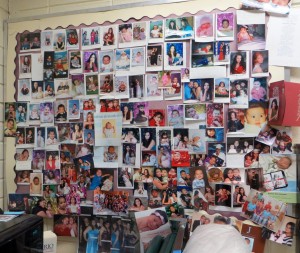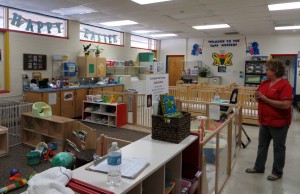
Years ago, Tucson High School student Monica Luna found herself 16 and pregnant.
She attended the Teenage Parent program at her school, and with their help, she was able to graduate, even finishing high school a semester early.
Now, decades later, Luna is familiar with a situation that a number of high school students are facing today, and she’s using her experience to help make a difference in Sunnyside Unified School District.
Sunnyside’s Teenage Parent Program (TAPP), through a longstanding partnership between El Rio Community Health Center and Sunnyside High School aims to increase graduation rates and provide support to pregnant teens. TAPP is separate from the Tucson Unified School District’s Teenage Parent program.
“The number one reason that girls drop out of high school is because they become pregnant,” said Jodi Ligget, director of policy for Planned Parenthood of Arizona.
“The majority of these girls are doing OK in school before they drop out,” she said. “The combination of a young mother without a high school diploma is a recipe for poverty.”
Arizona ranks sixth in the U.S. for teen pregnancy and fourth in high school dropouts, according to a 2013 study by the Guttmacher Institute.
The only program of its kind in Tucson, TAPP provides educational, social and health support for pregnant and parenting students throughout their time spent in high school. All services are provided on site to allow participants to maintain a more traditional high school schedule and experience. Other programs in Tucson Unified and Marana have separate schools for their pregnant teens.
Barb Novak, TAPP’s health coordinator and certified nurse midwife with El Rio Community Health Center, has been with the program since its inception in 1993.
“This program is the most comprehensive and most effective of its kind,” she said. “We see fewer dropouts and more healthy pregnancies.”
On the Sunnyside High School campus, students in the TAPP program have access to a pregnancy coordinator, educational and social support, nursing care and other resources. Novak also connects students to services such as pregnancy tests, birth control and emergency contraception.

“Our goal is to do what we can to help teens be more confident in decision making overall,” Novak said. “But also with future decisions regarding pregnancy, parenting and reproductive health.”
Sunnyside and the Pima County Health Department also have a mobile teen clinic on site at the school once a week, to discreetly provide services to students who might not otherwise visit the TAPP office or see a physician.
“For a person who likes working with teens, this is a dream place to be,” Novak said. “I’m in their lives every day.”
Another influential leader of TAPP is Tracy Pitts, who has served as its case manager since 1999. She helps the students through every aspect of their pregnancy, from arranging health coverage, providing emotional or crisis support, helping students who might be struggling academically, as well as college and career services.
“I know every intimate detail of these students’ lives,” Pitts said. “Some are guarded, depending on their background. It takes time to earn their trust.”
One of the educational tools TAPP utilizes is the “Baby Think It Over” doll. The computerized baby requires students to care for it, as they would a real infant. It cries when it needs to be fed, changed or burped and will do so several times a day to give the students a realistic impression of what caring for a baby may be like.
TAPP also encourages the fathers to be involved in the process, whether or not the couple is still together.
“We have six dads enrolled right now,” Pitts said. “That’s a record. They’re very involved and active in absorbing the information.”
Although Sunnyside offers what is called Family Life Education as a part of their regular health class, it is not a comprehensive form of sex education. Rather, it employs the abstinence-only approach, which does not include any education about contraception.
By contrast, TAPP students take a course in prenatal care and another in parenting, and receive credit for these classes. According to Pitts, the goal is to get these students through a healthy pregnancy and ensure their successful graduation.
As an added benefit for the students in TAPP, Sunnyside has a state licensed nursery on site for infants up to one year old. Girls in the program are encouraged to return to school two weeks after their delivery, if there are no complications for them or the baby.

The nursery services are free for most students through scholarships from First Things First, a state board that provides funding for programs that promote healthy child development. If the student doesn’t qualify for a scholarship, it costs $3 per day. However, the parents in the program must maintain passing grades and attendance to use the nursery.
Two long-time nursery workers are assisted by CPR-certified student aids to care for the babies in an active environment. The parents are required to spend their lunches in the nursery – feeding and changing their babies while they’re feeding themselves – to teach them time management.
Over the last five years, TAPP has averaged 148 participants per year. This includes males and females who are either pregnant and parenting. The program also provides preventative services for roughly 250 students a year.
Program Coordinator Monica Luna, meanwhile, is involved in every stage of the operation: she teaches the prenatal and parenting classes, coordinates with other employees and works with homebound students who cannot return to school immediately after their delivery. She also has every Sunnyside TAPP student in her homeroom, guaranteeing constant contact.
“Fortunately, this is a well-oiled machine that I got dropped into,” she said. “Prevention is our first goal in this program. If the student becomes pregnant, our goal turns into ‘We need to get this individual graduated.’”
Luna openly shares her own teen pregnancy experience with her children, elaborating on what it’s like to have a child while in school. When she was 18, even though she was using contraception, she became pregnant with twins.
“I fell into those statistics that said if you’re a teen parent, you will become pregnant again within two years,” she said. “I freak the students out with that story.”
She returned to school in her 30’s to become a teacher after doing clerical work for the University of Arizona Medical Center for more than a decade.
“When I graduated, I applied to Sunnyside and TUSD to teach for the TAPP program because I knew it was the best thing that happened to me,” Luna said. “I graduated a semester early because of it.”
She didn’t get the job at that time, and instead worked as a Spanish teacher for 11 years while also teaching parent education classes at the UA. She also worked as a doula, helping women give birth.
Through her work with the community, she taught a healthy pregnancy class at Sunnyside, where she met Novak. When the former TAPP director announced her retirement, Novak called Luna, who wasn’t even looking for work at the time.
“This was my dream job,” she said. “But I had to come full-circle and have that crazy experience to get here.”

For her TAPP students, Luna brings in presenters to discuss things such as the importance of vaccinations and post-partum depression. She said she accepts any speaker who is a specialist in a topic and can cover it on a deeper level than she can.
Sunnyside Unified School District also has TAPP programs available at Desert View High School and S.T.A.R. Academic Center, a school for students who learn best in non-traditional ways, need more time with teachers, or because of circumstances, are not able to regularly attend Desert View High School. Although both campuses have nurses on site, Pitts and Novak travel twice a week to Desert Vista and twice a month to S.T.A.R. to provide services to students.
Currently, Sunnyside has 28 students who are pregnant or parenting. Desert View has 17 and S.T.A.R. has 29.
“At S.T.A.R., I’m looking to give them more attention because those students being in that alternative option are at their last chance to get this done,” Luna said. “I think they’re in the most need of information and support if they’re pregnant or are parents.”
Even though she thinks the program already runs effectively, she still looks forward to implementing new ideas and – eventually – moving forward.
“I plan to retire from this position,” Luna said, laughing. “But that’s a long way off.”
[box]
For more info on TAPP, visit their website:
https://sites.google.com/site/susdtapp/home
[/box]

